英美文学选读第一单元
- 格式:ppt
- 大小:439.00 KB
- 文档页数:32
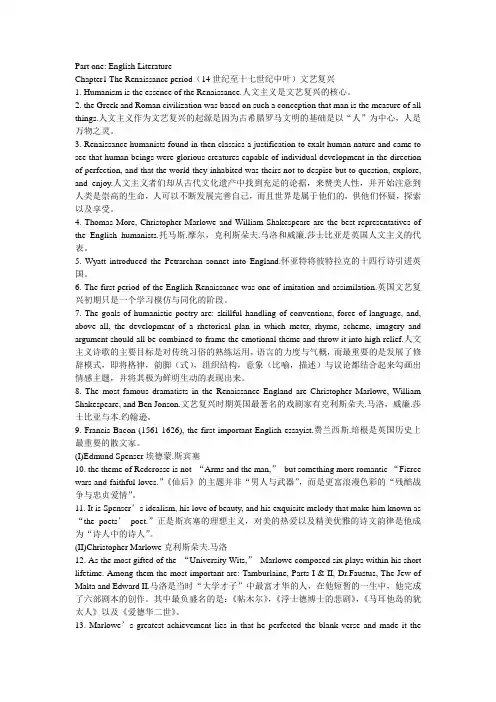
Part one: English LiteratureChapter1 The Renaissance period(14世纪至十七世纪中叶)文艺复兴1. Humanism is the essence of the Renaissance.人文主义是文艺复兴的核心。
2. the Greek and Roman civilization was based on such a conception that man is the measure of all things.人文主义作为文艺复兴的起源是因为古希腊罗马文明的基础是以“人”为中心,人是万物之灵。
3. Renaissance humanists found in then classics a justification to exalt human nature and came to see that human beings were glorious creatures capable of individual development in the direction of perfection, and that the world they inhabited was theirs not to despise but to question, explore, and enjoy.人文主义者们却从古代文化遗产中找到充足的论据,来赞美人性,并开始注意到人类是崇高的生命,人可以不断发展完善自己,而且世界是属于他们的,供他们怀疑,探索以及享受。
4. Thomas More, Christopher Marlowe and William Shakespeare are the best representatives of the English humanists.托马斯.摩尔,克利斯朵夫.马洛和威廉.莎士比亚是英国人文主义的代表。
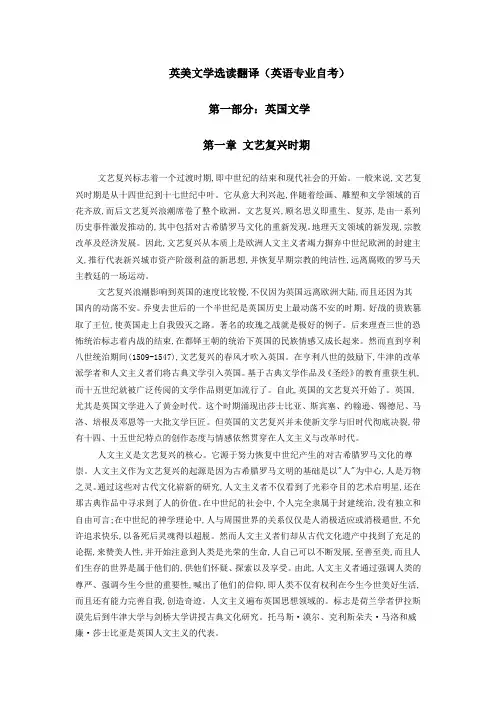
英美文学选读翻译(英语专业自考)第一部分:英国文学第一章文艺复兴时期文艺复兴标志着一个过渡时期,即中世纪的结束和现代社会的开始。
一般来说,文艺复兴时期是从十四世纪到十七世纪中叶。
它从意大利兴起,伴随着绘画、雕塑和文学领域的百花齐放,而后文艺复兴浪潮席卷了整个欧洲。
文艺复兴,顾名思义即重生、复苏,是由一系列历史事件激发推动的,其中包括对古希腊罗马文化的重新发现。
地理天文领域的新发现,宗教改革及经济发展。
因此,文艺复兴从本质上是欧洲人文主义者竭力摒弃中世纪欧洲的封建主义,推行代表新兴城市资产阶级利益的新思想,并恢复早期宗教的纯洁性,远离腐败的罗马天主教廷的一场运动。
文艺复兴浪潮影响到英国的速度比较慢,不仅因为英国远离欧洲大陆,而且还因为其国内的动荡不安。
乔叟去世后的一个半世纪是英国历史上最动荡不安的时期。
好战的贵族篡取了王位,使英国走上自我毁灭之路。
著名的玫瑰之战就是极好的例子。
后来理查三世的恐怖统治标志着内战的结束,在都铎王朝的统治下英国的民族情感又成长起来。
然而直到亨利八世统治期间(1509-1547),文艺复兴的春风才吹入英国。
在亨利八世的鼓励下,牛津的改革派学者和人文主义者们将古典文学引入英国。
基于古典文学作品及《圣经》的教育重获生机,而十五世纪就被广泛传阅的文学作品则更加流行了。
自此,英国的文艺复兴开始了。
英国,尤其是英国文学进入了黄金时代。
这个时期涌现出莎士比亚、斯宾塞、约翰逊、锡德尼、马洛、培根及邓恩等一大批文学巨匠。
但英国的文艺复兴并未使新文学与旧时代彻底决裂,带有十四、十五世纪特点的创作态度与情感依然贯穿在人文主义与改革时代。
人文主义是文艺复兴的核心。
它源于努力恢复中世纪产生的对古希腊罗马文化的尊崇。
人文主义作为文艺复兴的起源是因为古希腊罗马文明的基础是以"人"为中心,人是万物之灵。
通过这些对古代文化崭新的研究,人文主义者不仅看到了光彩夺目的艺术启明星,还在那古典作品中寻求到了人的价值。
![《英美文学选读》串讲课件(高度归纳版)[1]](https://uimg.taocdn.com/118bf6cfd0d233d4b14e6963.webp)
英美文学选读要点总结精心整理[英国』Chapter1 The Renaissance period(14世纪至十七世纪中叶)文艺复兴1. Humanism is the essence of the Renaissance.人文主义是文艺复兴的核心。
2. the Greek and Roman civilization was based on such a conception that man is the measure of all things.人文主义作为文艺复兴的起源是因为古希腊罗马文明的基础是以“人”为中心,人是万物之灵。
3. Renaissance humanists found in then classics a justification to exalt human nature and came to see that human beings were glorious creatures capable of individual development in the direction of perfection, and that the world they inhabited was theirs not to despise but to question, explore, and enjoy.人文主义者们却从古代文化遗产中找到充足的论据,来赞美人性,并开始注意到人类是崇高的生命,人可以不断发展完善自己,而且世界是属于他们的,供他们怀疑,探索以及享受。
4. Thomas More, Christopher Marlowe and William Shakespeare are the best representatives of the English humanists.托马斯.摩尔,克利斯朵夫.马洛和威廉.莎士比亚是英国人文主义的代表。
5. Wyatt introduced the Petrarchan sonnet into England.怀亚特将彼特拉克的十四行诗引进英国。
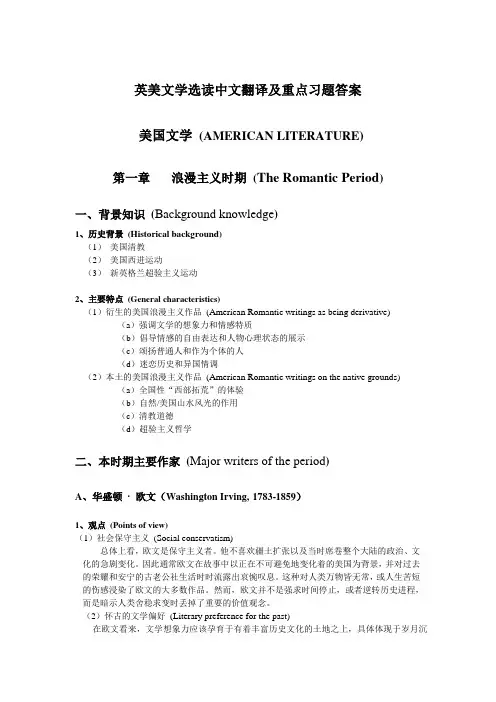
英美文学选读中文翻译及重点习题答案美国文学(AMERICAN LITERATURE)第一章浪漫主义时期(The Romantic Period)一、背景知识(Background knowledge)1、历史背景(Historical background)(1)美国清教(2)美国西进运动(3)新英格兰超验主义运动2、主要特点(General characteristics)(1)衍生的美国浪漫主义作品(American Romantic writings as being derivative) (a)强调文学的想象力和情感特质(b)倡导情感的自由表达和人物心理状态的展示(c)颂扬普通人和作为个体的人(d)迷恋历史和异国情调(2)本土的美国浪漫主义作品(American Romantic writings on the native grounds) (a)全国性“西部拓荒”的体验(b)自然/美国山水风光的作用(c)清教道德(d)超验主义哲学二、本时期主要作家(Major writers of the period)A、华盛顿·欧文(Washington Irving,1783-1859)1、观点(Points of view)(1)社会保守主义(Social conservatism)总体上看,欧文是保守主义者。
他不喜欢疆土扩张以及当时席卷整个大陆的政治、文化的急剧变化。
因此通常欧文在故事中以正在不可避免地变化着的美国为背景,并对过去的荣耀和安宁的古老公社生活时时流露出哀惋叹息。
这种对人类万物皆无常,或人生苦短的伤感浸染了欧文的大多数作品。
然而,欧文并不是强求时间停止,或者逆转历史进程,而是暗示人类舍稳求变时丢掉了重要的价值观念。
(2)怀古的文学偏好(Literary preference for the past)在欧文看来,文学想象力应该孕育于有着丰富历史文化的土地之上,具体体现于岁月沉积而成的珍宝中,如破败的城堡、坍塌的塔楼、艺术的珍品、高度文明社会的精妙物件以及远古和当地风俗的古怪意趣。
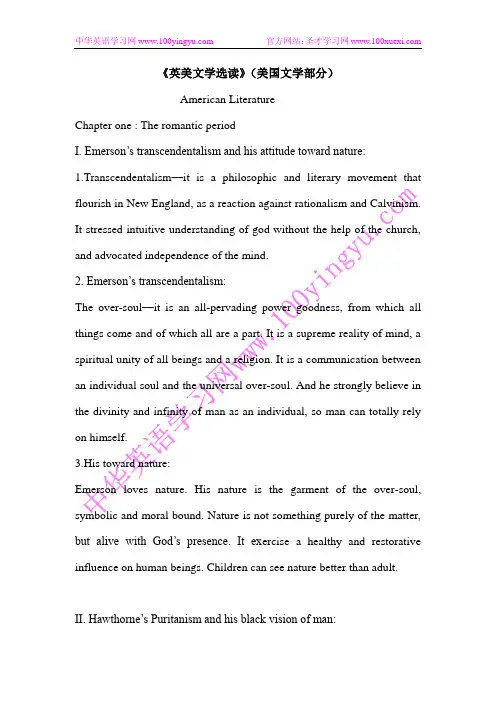
《英美文学选读》(美国文学部分)American LiteratureChapter one : The romantic periodI. Emerson’s transcendentalism and his attitude toward nature:1.Transcendentalism—it is a philosophic and literary movement that flourish in New England, as a reaction against rationalism and Calvinism. It stressed intuitive understanding of god without the help of the church, and advocated independence of the mind.2. Emerson’s transcendentalism:The over-soul—it is an all-pervading power goodness, from which all things come and of which all are a part. It is a supreme reality of mind, a spiritual unity of all beings and a religion. It is a communication between an individual soul and the universal over-soul. And he strongly believe in the divinity and infinity of man as an individual, so man can totally rely on himself.3.His toward nature:Emerson loves nature. His nature is the garment of the over-soul, symbolic and moral bound. Nature is not something purely of the matter, but alive with God’s presence. It ex ercise a healthy and restorative influence on human beings. Children can see nature better than adult.II. Hawthorne’s Puritanism and his black vision of man:1. Puritanism—it is the religious belief of the Puristans, who had intended to purify and simplify the religious ritual of the church of England.2. his black vision of man—by the Calvinistic concept of original sin, he believed that human being are evil natured and sinful, and this sin is ever present in human heart and will pass one generation to another.3. Young Goodman Brown—it shows that everyone has some evil secrets. The innocent and na?ve Brown is confronted with the vision of human evil in one terrible night, and then he becomes distrustful and doubtful. Brown stands for everyone ,who is born pure and has no contact with the real world ,and the prominent people of the village and church. They cover their secrets during daily lives, and under some circumstances such as the witch’s Sabbath, they become what they are. Even his closed wife, Faith, is no exception. So Brown is aged in that night.III. The symbolism of Melville’s Mobby-Dick1.The voyage to catch the white whale is the one of the mind in quest of the truth and knowledge of universe.2. To Ahab, the whale is an evil creature or the agent of an evil force that control the universe. As to readers, the whale is a symbol of physical limits, or a symbol of nature. It also can stand for the ultimate mystery of the universe and the wall behind which unknown malicious things are hiding.IV. Whitman and his Leaves of Grass :1. Theme: sing of the “en-mass” and the self / pursuit of love, happiness, and ***ual love / sometimes about politics (Drum taps)2. Whitman’s originality first in his use of the poetic form free verse (i.e. poetry without a fixed beat or regular rhyme scheme),by means of which he becomes conversational and casual.3.He uses the first person pronoun “I” to stress individualism, and oral language to acquire sympathy from the common reader.Chapter two : The realistic periodI. The character analysis and social meaning of Huck Finn in Adventure of Huckleberry Finn by Mark TwainHuck is a typical American boy with “a sound heart and a deformed conscience”. He appears to be vulgar in language and in manner, but he is honest and decent in essence. His remarkable raft’s journey down on the Mississippi river can be regarded as his process of education and his way to grow up. At first, he stands by slavery, for he clings to the idea that if he lets go the slave, he will be damned to go to hell. And when the “King” sells Jim for money, Huck decides to inform Jim’s master. After he thinks of the past good time when Jim and he are on the raft where Jim shows great care and deep affection for him, he decide to rescue Jim. AndHuck still thinks he is wrong while he is doing the right thing.Huck is the son of nature and a symbol for freedom and earthly pragmatism. Through the eye of Huck, the innocent and reluctant rebel, we see the pre-Civil War American society fully exposed. Twain contrasts the life on the river and the life on the banks, the innocence and the experience, the nature and the culture, the wilderness and the civilization.II. Daisy Miller by Henry James1. Theme: The novel is a story about American innocence defeated by the stiff, traditional values of Europe. James condemns the American failure to adopt expressive manners intelligently and point out the false believing that a good heart is readily visible to all. The death of Daisy results from the misunderstanding between people with different cultural backgrounds.2. The character analysis of Daisy: She represents typical American girl, who is uninformed and without the mature guidance. Ignorance and parental indulgence combine to foster he assertive self-confidence and fierce willfulness. She behaves in the same daring naive way in Europe as she does at home. When someone is against her, she becomes more contrary. She knows that she means no harm and is amazed that anyone should think she does. She does not compromise to the European manners.3. The character analysis of Winterbourne: He is a Europeanized American, who has live too long in foreign parts. He is very experience and has a problem understanding Daisy. He endeavors to put her in sort of formula, i.e. to classify her.III. Sister Carrie by Theodore Dreiser:1. Theme: The author invented the success of Carrie and the downfall of Hurstwood out of an inevitable and natural judgment, because the fittest can survive in a competitive, amoral society according to the social Darwinism.2. The character analysis of Carrie: She follows the right direction to a pursuit of the American dream, and the circumstances and her desire for a better life direct to the successful goal. But she is not contented, because with wealth and fame, she still finds herself lonely. She is a product of the society, a realization of the theory of the survival of the fittest.3. The character analysis of Hurstwood: He is a negative evidence of the theory of the survival of the fittest. Because he is still conventional and can not throw away the social morals, he is not fitted to live in New York.Chapter Three: The Modern PeriodI. Ezra Pound and his theory of Imagism1. The principles: a. direct treatment of the thing; b. to use absolutely noword that does not contribute to the presentation; c. to compose in the sequence of the musical; d. to use the language of common speech and the exact word; e. to create new rhythms; f. absolutely freedom in the choice of subject.2. Imagism is to present an intellectual and emotional complex in an instant of time. An imagistic poem must present the object exactly the way the thing is seen. And the reader can form the image of the object through the process of reading the abstract and concrete words.II. Frost and his poetry on nature:Frost is deeply interested in nature and in men’s relationship to nature. Nature appears as an explicator and a mediator for man and serve as the center of reference of his behavior. Peace and order can be found in Frost’s poetical natural world. With surface simplicity of his poems, the thematic concerns are always presented in rich symbols. Therefore his work resists easy interpretation.III. F. Scott Fitzgerald and his The Great Gatsby1. Theme: Gatsby is American Everyman. His extraordinary energy and wealth make him pursue the dream. His death in the end points at the truth about the withering of the American Dream. The spiritual and moral sterility that has resulted from the withered American Dream is fullyrevealed in the article. However, although he is defeated, the dream has gave Gatsby a dignity and a set of qualities. His hope and belief in the promise of future makes him the embodiment of the values of the incorruptible American Dream .2. The character analysis of Gatsby: Gatsby is great, because he is dignified and ennobled by his dream and his mythic vision of life. He has the desire to repeat the past, the desire for money, and the desire for incarnation of unutterable vision on this material earth. For Gatsby, Daisy is the soul of his dreams. He believe he can regain Daisy and romantically rebels of time. Although he has the wealth that can match with the leisured class, he does not have their manners. His tragedy lies in his possession of a naive sense and chivalry.IV. Ernest Hemingway’s artistic features:1. The Hemingway code heroes and grace under pressure:They have seen the cold world ,and for one cause, they boldly and courageously face the reality. They has an indestructible spirit for his optimistic view of life. Whatever is the result is, the are ready to live with grace under pressure. No matter how tragic the ending is, they will never be defeated. Finally, they will be prevail because of their indestructible spirit and courage.2. The iceberg technique:Hemingway believe that a good writer does not need to reveal every detail of a character or action. The one-eighth the is presented will suggest all other meaningful dimensions of the story. Thus, Hemingway’s language is symbolic and suggestive.V. The character analysis of Emily in A Rose for Emily:Emily is a symbol of old values, standing for tradition, duty and past glory. But she is also a victim to all those she cares and embrace. The source of Emily’s strange ness is from her born pride and self-esteem, the domineering behavior of her father and the betrayal of her lover. Barricaded in her house, she has frozen the past to protect her dreams. Her life is tragic because the defiance of the community, her refusal to accept the change and her extreme pride have pushed her to abnormality and insanity.。
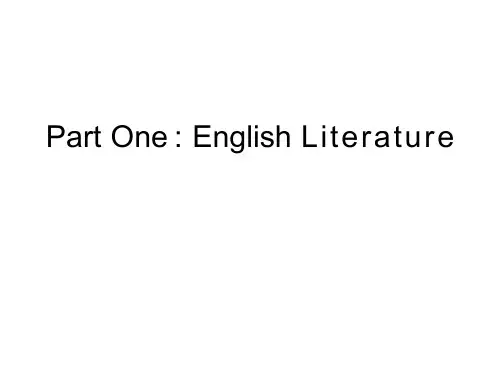
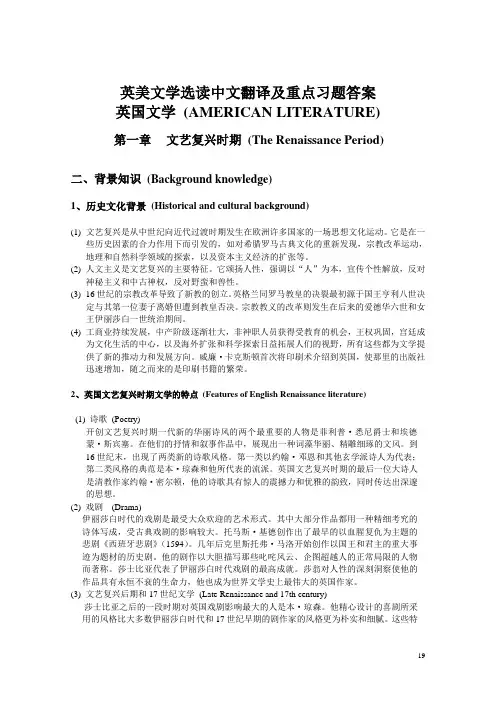
英美文学选读中文翻译及重点习题答案英国文学(AMERICAN LITERATURE)第一章文艺复兴时期(The Renaissance Period)二、背景知识(Background knowledge)1、历史文化背景(Historical and cultural background)(1)文艺复兴是从中世纪向近代过渡时期发生在欧洲许多国家的一场思想文化运动。
它是在一些历史因素的合力作用下而引发的,如对希腊罗马古典文化的重新发现,宗教改革运动,地理和自然科学领域的探索,以及资本主义经济的扩张等。
(2)人文主义是文艺复兴的主要特征。
它颂扬人性,强调以“人”为本,宣传个性解放,反对神秘主义和中古神权,反对野蛮和兽性。
(3)16世纪的宗教改革导致了新教的创立。
英格兰同罗马教皇的决裂最初源于国王亨利八世决定与其第一位妻子离婚但遭到教皇否决。
宗教教义的改革则发生在后来的爱德华六世和女王伊丽莎白一世统治期间。
(4)工商业持续发展,中产阶级逐渐壮大,非神职人员获得受教育的机会,王权巩固,宫廷成为文化生活的中心,以及海外扩张和科学探索日益拓展人们的视野,所有这些都为文学提供了新的推动力和发展方向。
威廉·卡克斯顿首次将印刷术介绍到英国,使那里的出版社迅速增加,随之而来的是印刷书籍的繁荣。
2、英国文艺复兴时期文学的特点(Features of English Renaissance literature)(1) 诗歌(Poetry)开创文艺复兴时期一代新的华丽诗风的两个最重要的人物是菲利普·悉尼爵士和埃德蒙·斯宾塞。
在他们的抒情和叙事作品中,展现出一种词藻华丽、精雕细琢的文风。
到16世纪末,出现了两类新的诗歌风格。
第一类以约翰·邓恩和其他玄学派诗人为代表;第二类风格的典范是本·琼森和他所代表的流派。
英国文艺复兴时期的最后一位大诗人是清教作家约翰·密尔顿,他的诗歌具有惊人的震撼力和优雅的韵致,同时传达出深邃的思想。
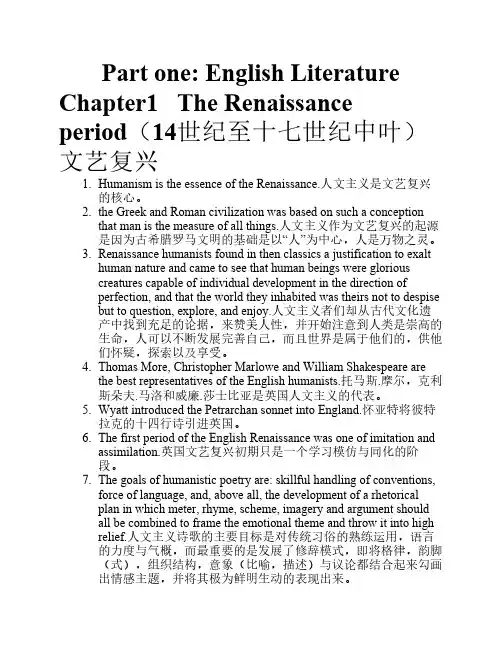
Part one: English Literature Chapter1 The Renaissance period(14世纪至十七世纪中叶)文艺复兴1. Humanism is the essence of the Renaissance.人文主义是文艺复兴的核心。
2. the Greek and Roman civilization was based on such a conceptionthat man is the measure of all things.人文主义作为文艺复兴的起源是因为古希腊罗马文明的基础是以“人”为中心,人是万物之灵。
3. Renaissance humanists found in then classics a justification to exalthuman nature and came to see that human beings were gloriouscreatures capable of individual development in the direction ofperfection, and that the world they inhabited was theirs not to despisebut to question, explore, and enjoy.人文主义者们却从古代文化遗产中找到充足的论据,来赞美人性,并开始注意到人类是崇高的生命,人可以不断发展完善自己,而且世界是属于他们的,供他们怀疑,探索以及享受。
4. Thomas More, Christopher Marlowe and William Shakespeare arethe best representatives of the English humanists.托马斯.摩尔,克利斯朵夫.马洛和威廉.莎士比亚是英国人文主义的代表。
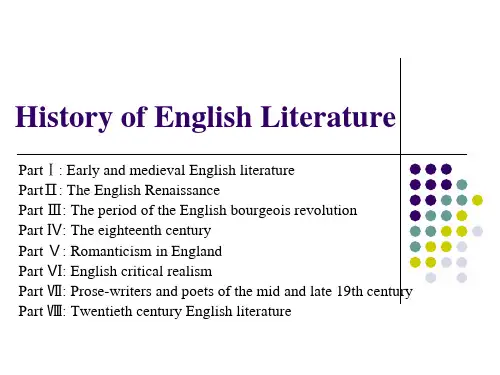
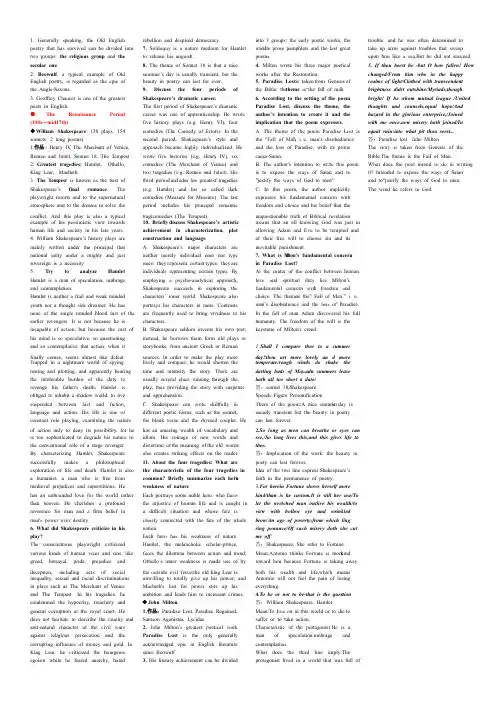
1. Generally speaking, the Old English poetry that has survived can be divided into two two groups: groups: the the religious religious religious group group and the secular one . 2. Beowulf , a typical example of Old English English poetry, poetry, poetry, is is is regarded regarded regarded as as as the the the epic epic epic of of the Anglo-Saxons. 3. 3. Geoffrey Geoffrey Geoffrey Chaucer Chaucer Chaucer is is is one one one of of of the the the greatest greatest poets in English.●The Renaissance Period (14th---mid17th)◆William Shakespeare : : (38 (38 (38 plays, plays, 154 sonnets, 2 long poems) 1.作品:Henry IV , The Merchant of Venice, Romeo and Juliet, Sonnet 18, The Tempest 2. Greatest Greatest tragedies:tragedies:Hamlet, Othello, King Lear, Macbeth. 3. The The Tempest Tempest is is known known known as as as the the the best best best of of Shakespeare Shakespeare’’s final romance . The playwright playwright resorts resorts resorts and and and to to to the the the supernatural supernatural atmosphere atmosphere and and and to to to the the the dreams dreams dreams to to to solve solve solve the the conflict. And And this this play play is is is also also a a typical typical example example of of of his his his pessimistic pessimistic view view towards towards human life and society in his late years. 4. 4. William William William Shakespeare Shakespeare Shakespeare’’s s history history history plays plays plays are are mainly written under the principal that national unity under a mighty and just sovereign is a necessity. 5.Try to analyze Hamlet Hamlet Hamlet is is is a a a man man man of of of speculation, speculation, speculation, umbrage umbrage and contemplation.Hamlet Hamlet is is is neither neither neither a a a frail frail frail and and and weak weak weak minded minded youth youth nor nor nor a a a thought thought thought sick sick sick dreamer. dreamer. dreamer. He He He has has none of the single minded blood lust of the earlier earlier revengers. revengers. revengers. It It It is is is not not not because because because he he he is is incapable of action, but because the cast of his his mind mind mind is is is so so so speculative, speculative, speculative, so so so questioning questioning and and so so so contemplative contemplative contemplative that that that action, action, action, when when when it it finally comes, seems almost like like defeat. defeat. Trapped Trapped in in in a a a nightmare nightmare nightmare world world world of of of spying, spying, testing and plotting, and apparently bearing the intolerable burden of the duty to revenge his father's death, Hamlet is obliged obliged to to to inhabit inhabit inhabit a a a shadow shadow shadow world, world, world, to to to live live suspended between fact and fiction, language and action. His life is one of constant role playing, examining the nature of action only to deny its possibility, for he is too sophisticated to degrade his nature to the the conventional conventional conventional role role role of of of a a a stage stage stage revenger. revenger. By characterizing Hamlet, Shakespeare successfully makes a philosophical exploration of life and death. Hamlet is also a humanist, a man who is free from medieval medieval prejudices prejudices prejudices and and and superstitions. superstitions. superstitions. He He has an unbounded love for the world rather than heaven. He cherishes a profound reverence for man and a firm belief in man's power over destiny. 6. 6. What What What did did did Shakespeare Shakespeare Shakespeare criticize criticize criticize in in in his his play? The conscientious playwright criticized various kinds of human vices and sins, like greed, betrayal, pride, prejudice and deception, including acts of social inequality, sexual and racial discriminations in in plays plays plays such such such as as as The The The Merchant Merchant Merchant of of of V V enice and The Tempest. In his tragedies, he condemned the hypocrisy, treachery and general general corruption corruption corruption at at at the the the royal royal royal court. court. court. He He does not hesitate to describe the cruelty and anti-natural character of the civil wars against religious persecution and the corrupting influence of money and gold. In King Lear, he criticized the bourgeois egoism while he feared anarchy, hated rebellion and despised democracy. 7. Soliloquy is a nature medium for Hamlet to release his anguish. 8.The The theme theme theme of of of Sonnet Sonnet Sonnet 18 18 18 is is is that that that a a a nice nice summer summer’’s s day day day is is is usually usually usually transient, transient, transient, but but but the the beauty in poetry can last for ever. 9.Discuss the four periods of Shakespeare Shakespeare’’s dramatic career. The The first first first period period period of of of Shakespeare Shakespeare Shakespeare’’s s dramatic dramatic career was one of apprenticeship. He wrote five history plays (e.g. Henry VI), four comedies comedies (The (The (The Comedy Comedy Comedy of of of Errors). Errors). Errors). In In In the the second period, Shak Shakespeare’s espeare’s style and approach became highly individualized. He wrote wrote five five five histories histories histories (e.g. (e.g. (e.g. Henry Henry Henry IV), IV), IV), six six comedies (The (The Merchant Merchant Merchant of of of V V enice) and two two tragedies tragedies tragedies (e.g. (e.g. (e.g. Romeo Romeo Romeo and and and Juliet). Juliet). Juliet). His His third period includes includes his greatest' his greatest' tragedies (e.g. Hamlet) and his so called dark comedies comedies (Measure (Measure (Measure for for for Measure). Measure). Measure). The The The last last period includes his principal romantic tragicomedies (The Tempest). 10. Briefly discuss discuss Shakespeare’Shakespeare’Shakespeare’s artistic s artistic achievement in characterization, plot construction and language A. Shakespeare’s major char characters acters are neither merely individual ones nor type ones; they represent certain types; they are individuals individuals representing representing representing certain certain certain types. types. types. By By employing a psycho-analytical approach, Shakespeare succeeds in exploring the characters characters’’inner inner world. world. world. Shakespeare Shakespeare Shakespeare also also portrays portrays his his his characters characters characters in in in pairs. pairs. pairs. Contrasts Contrasts are frequently used to bring vividness to his characters. B. Shakespeare seldom invents his own plot; instead, he borrows them form old plays or storybooks, storybooks, from from from ancient ancient ancient Greek Greek Greek or or or Roman Roman sources. sources. In In In order order order to to to make make make the the the play play play more more lively lively and and and compact, compact, compact, he he he would would would shorten shorten shorten the the time and intensity the story. There are usually usually several several several clues clues clues running running running through through through the the play, thus providing the story with suspense and apprehension. C. Shakespeare can write skillfully in different different poetic poetic poetic forms, forms, forms, such such such as as as the the the sonnet, sonnet, the blank verse and the rhymed couplet. He has has an an an amazing amazing amazing wealth wealth wealth of of of vocabulary vocabulary vocabulary and and idiom. His coinage of new words and distortion of the the meaning of meaning of the the old words old words also creates striking effects on the reader. 11. 11. About About About the the the four four four tragedies: tragedies: tragedies: What What What are are the characteristic of the four tragedies in common? Briefly summarize each hero ’s weakness of nature Each Each portrays portrays portrays some some some noble noble noble hero, hero, hero, who who who faces faces the injustice of human life and is caught in a difficult situation and whose fate is closely connected with the fate of the whole nation. Each hero has his weakness of nature: Hamlet, the melancholic scholar-prince, faces the dilemma between action and mind; Othello’s inner weakness is made use of by the the outside evil force; outside evil force; t he the the old old old king king king Lear Lear Lear is is unwilling to totally give up his power; and Macbeth's lust for power stirs up his ambition and leads him to incessant crimes. ◆John Milton 1.作品:Paradise Lost ,Paradise Regained ,Samson Agonistes ,Lycidas 2.John Milton Milton’’s greatest poetical work Paradise Lost is the only generally acknowledged epic in English literature since Beowulf 3.His His literary literary literary achievement achievement achievement can can can be be be divided divided into into 3 3 3 groups: groups: groups: the the the early early early poetic poetic poetic works, works, works, the the middle middle prose prose prose pamphlets pamphlets pamphlets and and and the the the last last last great great poems. 4. Milton Milton wrote wrote wrote his his his three three three major major major poetical poetical works after the Restoration. 5. Paradise Lost is taken from Genesis of the Bible; the theme is “the fall of man ”6. 6. According According According to to to the the the setting setting setting of of of the the the poem poem Paradise Lost, discuss the theme, the author author’’s s intention intention intention to to to create create create it it it and and and the the implication that the poem expresses. A. The theme of the poem Paradise Lost is the "Fall of Man ”, i . e. man's disobedience . e. man's disobedience and and the the the loss loss loss of of of Paradise, Paradise, Paradise, with with with its its its prime prime cause-Satan. B. The author's intention to write this poem is to expose the ways of Satan and to "justify the ways of God to men". C. In this poem, the author implicitly expresses his fundamental concern with freedom freedom and and and choice choice choice and and and his his his belief belief belief that that that the the unquestionable unquestionable truth truth truth of of of Biblical Biblical Biblical revelation revelation means that an all knowing God was just in allowing Adam and Eve to be tempted and of their free will to choose sin and its inevitable punishment. 7. What is M ilton’s ilton’s fundamental concern fundamental concern in Paradise Lost? At the center of the conflict between human love and spiritual duty lies M ilton’s fundamental concern with freedom and choice. The theme is the” Fall of Man,” i. e. man’s man’s disobedience and the loss of Paradise. disobedience and the loss of Paradise. In the fall of man Adam discovered his full humanity. humanity. The The The freedom freedom freedom of of of the the the will will will is is is the the keystone of Milton's creed. 1.Shall I compare thee to a summer day?thou art more lovely an d more temperate:rough winds do shake the darling darling buds buds buds of of of May.adn May.adn May.adn summers summers summers lease lease hath all too short a date: 答:sonnet 18,Shakespeare Speech Figure Personification Them of the poem:A nice summer ’s day is usually usually transient transient transient but but but the the the beauty beauty beauty in in in poetry poetry can last forever. 2.So long as men can breathe or eyes can see,/So long lives this,and this gives life to thee. 答:Implication of the work: the beauty in poety can last forever, Idea Idea of of of the the the two two two line line line express:Shakespeare express:Shakespeare express:Shakespeare’’s faith in the permanence of poetry. 3.For For herein herein herein Fortune Fortune Fortune shows shows shows herself herself herself more more kind/than is he custom.It is still her use/To let the wretched man outlive his wealth/to view with hollow eye and wrinkled brow/An brow/An age age age of of of poverty:from poverty:from poverty:from which which which ling ling ring penance/Of such misery doth she cut me off .答:Shakespeare, She refer to Fortune. Mean:Antonio thinks Fortune is more kind toward him because Fortune is taking away both his wealth and life,which means Antomio Antomio will will will not not not feel feel feel the the the pain pain pain of of of losing losing everything. 4.To be or not to be-that is the question : 答:William Shakespeare, Hamlet. Mean:To Mean:To live live live on on on in in in this this this world world world or or or to to to die:to die:to suffer or to take action. Characteristic of the protagonist:He is a man of speculation,umbrage and contemplation What does the third line imply:The protagonist lived in a world that was full of trouble, trouble, and and and he he he was was was often often often determined determined determined to to take take up up up arms arms arms against against against troubles troubles troubles that that that sweep sweep upon him like a sea,But he did not succeed. 5. If thou beest he -but O how fallen! How changed/From him who in the happy realms realms of of of light/Clothed light/Clothed light/Clothed with with with transcendent transcendent brightness brightness didst didst didst outshine/Myriads,though outshine/Myriads,though bright! If he whom mutual league /United thoughts and counsels,equal hope/And hazard hazard in in in the the the glorious glorious glorious enterprise,/Joined enterprise,/Joined with with me me me once,now once,now once,now misery misery misery hath hath hath joined/In joined/In equal ruin:into what pit thou seest... 答:Paradise lost John Milton The story story is is is taken taken from Genesis of of the the Bible,The theme is the Fall of Man. What does the poet intend to do in writing it? it? Intended Intended Intended to to to expose expose expose the the the ways ways ways of of of Satan Satan and to “justify the ways of God to men. The word he refers to God. 。
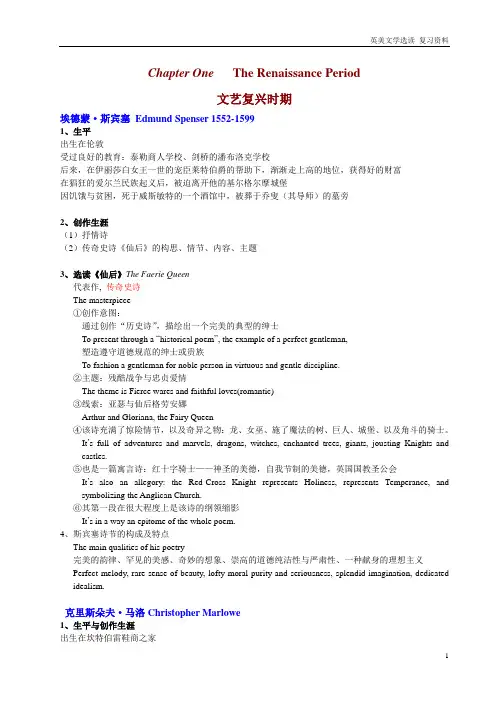
Chapter One The Renaissance Period文艺复兴时期埃德蒙·斯宾塞Edmund Spenser 1552-15991、生平出生在伦敦受过良好的教育:泰勒商人学校、剑桥的潘布洛克学校后来,在伊丽莎白女王一世的宠臣莱特伯爵的帮助下,渐渐走上高的地位,获得好的财富在猖狂的爱尔兰民族起义后,被迫离开他的基尔格尔摩城堡因饥饿与贫困,死于威斯敏特的一个酒馆中,被葬于乔叟(其导师)的墓旁2、创作生涯(1)抒情诗(2)传奇史诗《仙后》的构思、情节、内容、主题3、选读《仙后》The Faerie Queen代表作, 传奇史诗The masterpiece①创作意图:通过创作“历史诗”,描绘出一个完美的典型的绅士To present through a “historical poem”, the example of a perfect gentleman,塑造遵守道德规范的绅士或贵族To fashion a gentleman for noble person in virtuous and gentle discipline.②主题:残酷战争与忠贞爱情The theme is Fierce wares and faithful loves(romantic)③线索:亚瑟与仙后格劳安娜Arthur and Gloriana, the Fairy Queen④该诗充满了惊险情节,以及奇异之物:龙、女巫、施了魔法的树、巨人、城堡、以及角斗的骑士。
It‟s full of adventures and marvels, dragons, witches, enchanted trees, giants, jousting Knights and castles.⑤也是一篇寓言诗:红十字骑士——神圣的美德,自我节制的美德,英国国教圣公会It‟s also an allegory: the Red-Cross Knight represents Holiness, represents Temperance, and symbolizing the Anglican Church.⑥其第一段在很大程度上是该诗的纲领缩影It‟s in a way an epitome of the whole poem.4、斯宾塞诗节的构成及特点The main qualities of his poetry完美的韵律、罕见的美感、奇妙的想象、崇高的道德纯洁性与严肃性、一种献身的理想主义Perfect melody, rare sense of beauty, lofty moral purity and seriousness, splendid imagination, dedicated idealism.克里斯朵夫·马洛Christopher Marlowe1、生平与创作生涯出生在坎特伯雷鞋商之家先后靠奖学金在王室学校和剑桥大学读书在剑桥大学期间,创作了《帖木儿》1584年后,深受文艺复兴思潮影响,体现在《浮士德博士的悲剧》具备了放荡不羁的热情和初入知识王国的青年所拥有的自负死于一次在酒店与别人发生口角而引发的械斗中2、著名悲剧(1)《铁木耳大帝》讲述一个普通牧民铁木耳如何登上国王宝座,成为一个野心勃勃、残暴无情的鞑靼统治者的故事。
英美文学选读要点总结精心整理英美文学选读要点总结精心整理[英国』Chapter1 The Renaissance period(14世纪至十七世纪中叶)文艺复兴1. Humanism is the essence of the Renaissance.人文主义是文艺复兴的核心。
2. the Greek and Roman civilization was based on such a conception that man is the measure of all things.人文主义作为文艺复兴的起源是因为古希腊罗马文明的基础是以“人”为中心,人是万物之灵。
3. Renaissance humanists found in then classics a justification to exalt human nature and came to see that human beings were glorious creatures capable of individual development in the direction of perfection, and that the world they inhabited was theirs not to despise but to question, explore, and enjoy.人文主义者们却从古代文化遗产中找到充足的论据,来赞美人性,并开始注意到人类是崇高的生命,人可以不断发展完善自己,而且世界是属于他们的,供他们怀疑,探索以及享受。
4. Thomas More, Christopher Marlowe and William Shakespeare are the best representatives of the Englishhumanists.托马斯.摩尔,克利斯朵夫.马洛和威廉.莎士比亚是英国人文主义的代表。
自考英美文学选读第一章浪漫主义时期(美国)(课文翻译)英美文学选读翻译(英语专业自考)第二部分:美国文学第一章浪漫主义时期浪漫主义时期开始于十八世纪末,到内战爆发为止,是美国文学史上最重要的时期。
华盛顿·欧文出版的《见闻札记》标志着美国文学的开端,惠特曼的《草叶集》是浪漫主义时期文学的压卷之作。
浪漫主义时期的文学是美国文学的繁荣时期,所以也称为"美国的文艺复兴。
"美国社会的发展哺育了"一个伟大民族的文学"。
年轻的美国没有历史的沉重包袱,很快在政治、经济和文化方面成长为一个独立的国家。
这一时期也是美国历史上西部扩张时期,到1860年领土已开拓到太平洋西岸。
到十九世纪中叶,美国已由原来的十三个州扩大到二十一个州,人口从1790年的四百万增至1860年的三千万。
在经济上,年轻的美国经历向工业的转化,影响所及不仅仅是城市,而且也包括农村。
蒸汽动力在工、农业生产上的运用、工厂的建立、劳动力的大量需求以及科技上的发明创造使经济生活得到了重组。
另外,大量移民促进了工业更加蓬勃的发展。
政治上,民主与平等成为这个年轻国家的理想,产生了两党制。
值得一提的是这个国家的文学和文化生活。
随着独立的美国政府的成立,美国人民已感到需要有美国文学,表达美国人民所特有的经历:早期清教徒的殖民,与印第安人的遭遇,边疆开发者的生活以及西部荒原等。
这个年轻国家的文学富有想象,已产生了一种文学环境。
报刊杂志如雨后春笋,出现了一大批文学读者,形成了十九世纪上半叶蓬勃的浪漫主义的文学思潮。
外国的,尤其是英国的文学大师对美国作家产生了重大影响。
美国作家由于秉承了与英国一样的文化传统,形成了同英国一样的浪漫主义风格。
欧文(Irving)、库柏(Cooper),坡(Poe),弗伦诺(Freneau)和布雷恩特(Bryant)一一反古典主义时期的文学样式和文学思潮,开创了较新的小说和诗歌形式。
这一时期大多数美国文学作品中,普遍强调文学的想象力和情感因素,注重生动的描写、异国情调的表达、感官的体会和对超自然力的描述。
自学考试英美文学选读Selected Readings In English And American LiteraturesPart one: English literatureAn Introduction to Old and Medieval English Literature 1. The Old English poetry that has survived can be divided into two group:the religious group and the secular one. The poetry of the religious group is mainly on biblical themes………In addition to these religious compositions, Old English poets produced the national epic poem, Beowulf, a typical example of Old English poetry, is regarded today as the national epic of the Anglo-Saxons.2. Romance which uses narrative verse or prose to sing knightlyadventures or other heroic deeds is a popular literary form in the medieval period. R omantic love is an important part of the plot in romance.3. I t is Chaucer alone who, for the first time in English literature,presented to us a comprehensive realistic picture of the English society of his time and created a whole gallery of vivid characters from all walks of life in his masterpiece The Canterbury Tales.Geoffrey Chaucer is the greatest writer of this period. I n short, Chaucer develops his characterization to a higher artistic level by presenting characters with both typical qualities and individual dispositions. Chaucer introduced from France the rhymed stanzas of various types to English poetry to replace the Old English alliterative verse. Chaucer dominated the works of his15th-centtruy English followers and the so-called Scottish Chaucerians. For the Renaissance, he was the English Homer.Chapter 1 The Renaissance Period1. The Renaissance arks a transition from the medieval to the modernworld. Generally, it refers to the period between the14th and mid-17th centuries.T he Renaissance is a historical period in which the European humanist thinkers and scholars made attempts to get rid of those old feudalist ideas in medieval Europe, to introduce new ideas that expressed the interests of the rising bourgeoisie, and to recover thepurity of the early church form the corruption of the Roman Catholic Church. B ut it was not until the reign of Henry VIII that the Renaissance really began to show its effect in England.The English Renaissance had no sharp break with the past. Attitudes and feelings which had been characteristic of the 14th and 15th centuries persisted well down into the era of Humanism and Reformation.2. Humanism is the essence of the Renaissance. T hus, by emphasizingthe dignity of human beings and the importance of the present life, they voiced their beliefs that man did not only have the right to enjoy the beauty of this life, but had the ability to perfect himself and to perform wonders.3. S trong national feeling in the time of the Tudors gave a greatincentive to the cultural development in England. W ith classical culture and the Italian humanistic ideas coming into England, the English Renaissance began flourishing.T he first period of the English Renaissance was one of imitation and assimilation. T he Elizabethan drama, in its totality, is the real mainstream of the English Renaissance.4. F rom Wyatt and Surrey onwards the goals of humanistic poetry are:skillful handling of conventions, force of language, and, above all, the development of a rhetorical plan in which meter, rhyme, scheme, imagery and argument should all be combined to frame the emotional theme and throw it into high relief. P oetry was to be a concentrated exercise of the mind, of craftsmanship, and of learning.I. Edmund Spenser (埃德蒙·斯宾塞)1. Spenser’s masterpiece is The Faerie Queene, a great poem of its age.A ccording to Spenser’s own explanation, his principal intention is topresent through a “historical poem” the example of a perfect gentleman: “to fashion a gentleman or noble person in virtuous and gentle discipline.”2. The five main qualities of Spenser’s poetry are 1) a perfect melody;2) a rare sense of beauty; 3) a splendid imagination; 4) a lofty moralpurity and seriousness; and 5) a dedicated idealism.II. Christopher Marlowe(克里斯托夫·马洛)1. M asterpieces: Tamburlaine, Parts I ⅈ Dr. Faustus; The Jew ofMalta; Edward II2. Tamburlaine is a play about an ambitious and pitiless Tartarconqueror in the fourteenth century who rose from a shepherd to an overpowering king. I n fact, Tamburlaine is a product of Marlowe’s characteristically Renaissance imagination, fascinated by the earthlymagnificence available to men of imaginative power who have the energy of their convictions.3. D r. Faustus is a play based on the German legend of a magicianaspiring for knowledge and finally meeting his tragic end as a result of selling his soul to the Devil. I t celebrates the human passion for knowledge, power and happiness; it also reveals man’s frustration in realizing the high aspirations in a hostile moral order. A nd the confinement to time is the cruelest fact of man’s condition. Marlowe praises his soaring aspiration for knowledge while warning against the sin of pride since Faustus’s downfall was caused by his despair I god and trust in Devil.4. M arlowe’s greatest achievement lies in that he perfected the blankverse and made it the principal medium of English drama. Marlowe employed hyperbole as his major figure of speech, which, instead of referring to the exaggeration of the language, indicates the poetic energy and intensity conveyed through the verseMarlowe’s second achievement is his creation of the Renaissance hero for English drama. D ifferent from the tragic hero I medieval plays, who seeks the way to heaven through salvation and God’s will, he is against convention al morality and contrives to obtain heaven on earth through his own efforts.III. William Shakespeare (威廉·莎士比亚)1. T he first period of Shakespeare’s dramatic career was one ofapprenticeship.(Henry VI; Richard III; The Comedy of Errors.In the second period, Shakespeare’s style and approach became highly individualized. B y constructing a complex pattern between different characters and between appearance and reality, Shakespeare made subtle comments on a variety of human foibles. (The M idsummer Night’s Dream;The Merchant of Venice; Romeo and Juliet.S hakespeare’s third period includes his greatest tragedies and his so-called dark comedies. (Hamlet; Othello; King Lear)T he last period of Shakespeare’s work includes his principal romantic tragicomedies.2. S hakespeare’s history plays are mainly written under the principlethat national unity under a mighty and just sovereign is a necessity.3. I n his romantic comedies, Shakespeare takes an optimistic attitudetoward love and youth, and the romantic elements are brought into full play. T he most important play among the comedies is The Merchant of Venice. T he sophistication derives in part from the play between high, outgoing romance and dark forces of negativity and hate. T he traditional theme of this play is to praise the friendship between Antonio and Bassanio, to idealize Portia as a heroine of great beauty,wit and loyalty, and to expose the insatiable greed and brutality of the Jew.C ompared with the idealism of other plays, The Merchant of Venicetakes a step forward in its realistic presentation of human nature and human conflict. T hough there is a ridiculous touch on the part of the characters restrained by their limitations, Shakespeare’s youthful Renaissance spirit of jollity can be fully seen in contrast to the medieval emphasis on future life in the next world.4. T he successful romantic tragedy is Romeo and Juliet, which eulogizesthe faithfulness of love and the spirit of pursuing happiness. T he play, though a tragedy, is permeated with optimistic spirit.5. S hakespeare’s greatest tragedies are: Hamlet, Othello, King Lear,and Macbeth. T hey have some characteristics in common. Each portrays some noble hero, who faces the injustice of human life and is caught in a difficult situation and whose fate is closely connected with the fate of the whole action. E ach hero has his weakness of nature. W ith the concentration on the tragic hero, we see the sharp conflicts between the individual and the evil force in the society, which shows that Shakespeare is a great realist in the true sense.6. T he hero Hamlet in Shakespeare’s play Hamlet is noted for hishesitation to take his revenge, his melancholy nature of action only to deny possibilities to do anything. H e came to know that his father was murdered by his uncle who became king. He hated him so deeply that he wanted to kill him. B ut he loved his widowed mother who later married his uncle, and he was afraid to hurt his mother. A nd also, when everything was ready for him to kill his uncle, he forgave him for his uncle was praying to God for his crime. T hus he lost the good chance.H amlet represented humanism of his time.7. S hakespeare takes the bare outlines of Revenge Tragedy, but whathe adds is infinitely more interesting than what he adopts. A nd the timeless appeal of this mighty drama lies in its combination of intrigue, emotional conflict and searching philosophic melancholy. T his play is also Shakespeare’s most detailed expose of a corrupted court—“an unweeded garden” in which there is nothing but“a foul and pestilent congregation of vapours.”B y revealing the power-seeking ,the jostling for place the hidden motives, the courteous superficialities that veil lust and guilt, Shakespeare condemns the hypocrisy and treachery and general corruption at the royal court.8. Shakespeare, as a humanist of the time, is against religiouspersecution and racial discrimination, against social inequality and the corrupting influence of gold and money. I n his plays, he does not hesitate to describe the cruelty and anti-natural character of the civil wars, but he did not go all the way against the feudal rule.9. S hakespeare’s views on literature:Shakespeare has accepted the Renaissance views on literature. H e holds that literature should be a combination of beauty, kindness and truth, and should reflect nature and reality. Shakespeare also states that literary works which have truly reflected nature and reality can reach immortality.10. T he characteristics of Shakespeare’s characters:S hakespeare’s major characters are neither merely individual ones nor type ones; they are individuals representing certain types. E ach character has his or her own personalities; meanwhile, they may share features with others.11. T he characteristics of Shakespeare’s plot:S hakespeare’s plays are well-known for their adroit plot construction.S hakespeare seldom invents his own plots; instead, he borrows them from some old plays or storybooks, or from ancient Greek and Roman sources.12. T he characteristics of Shakespeare’s language:I t is necessary to study the subtlest of his instruments—thelanguage. Shakespeare can write skillfully in different poetic form, like the sonnet, the blank verse, and the rhymed couplet. H e has an amazing wealth of vocabulary and idiom. H is coinage of new words and distortion of the meaning of the old ones also create striking effects on the reader.IV. Francis Bacon (弗兰西斯·培根)1. Francis Bacon, a representative of the Renaissance in England, isa well-known philosopher, scientist and essayist.2. T he most important works of his first group include The Advancementof Learning; Novum Organum. H is philosophical works also belong to the first group. H is literary works are in the second group, among which the most famous is Essays. Maxis of Law and The Learned Reading upon the Statute of Uses are the two famous works from the third group.3. N ovum Organum is a successful treatise written in Latin on methodology.I t is the most impressive display of bacon’s intellect. T he argumentis for the use of inductive method of reasoning in scientific study.B ut Bacon first expounds the four great false conceiving that beset men’smind and prevent them from seeking the truth. B acon suggests the inductive reasoning, i.e. proceeding from the particular to the general, the deductive reasoning, putting forward this theory. B acon shows the new empirical attitudes toward truth about nature and bravely challenges the medieval scholasticists.4. T he Advancement of Learning is a great tract on education. B aconhighly praises knowledge, refuting the objections to learning and outlining the problems with which his plan is to deal. A ccording to Bacon, man’s understanding consists of three parts: history to man’smemory, poetry to man’s imagination and creation, and philosophy to man’s reason.5. B acon cares more about axioms under the guidance of which man thinkand acts than human nature or morality.B acon’s essays are famous for their brevity, compactness andpowerfulness. T he essays are well-arranged and enriched by Biblical allusions, metaphors and cadence.6. O f Studies is the most popular of Bacon’s 58 essays. I t analyzes whatstudies chiefly serve for, the different ways adopted by different people to pursue studies, and how studies exert influence over human character. F orceful and persuasive, compact and precise. O f Studies reveals to us Bacon’s mature attitude towards learning.V. J ohn Donne (约翰·邓恩)1. T he term “metaphysical poetry”is commonly used to name the work ofthe 17th-century writers who wrote under the influence of John Donne.W ith a rebellious spirit the metaphysical poets tried to break away from the conventional fashion of the Elizabethan love poetry. T he diction is simple as compared with that of the Elizabethan or the Neoclassic periods, and echoes the words and cadences of common speech. T he imagery is drawn from the actual life. T he form is frequently that of an argument with the poet’s beloved, with God, or with himself.2. T he Elegies and Satires; The Songs and Sonnets.VI. J ohn Milton (约翰·弥尔顿)1. Paradise Lost ; Paradise Regained; Samson Agonistes.2. P aradise Lost is about Eve, seduced by Satan’s rhetoric and her ownconfused ambition—as well as the mere prompting of hunger—falls into sin through innocent credulity. A dam falls by consciously choosing human love rather than obeying God. T his is the error wherein his greatness lies.I n the fall of man Adam discovered his full humanity. B ut man’s fallis the sequel to another and more stupendous tragedy.3. W orking through the tradition of a Christian humanism, Milton wroteParadise Lost, intending to expose the ways of Satan and to “justify the ways of God to men.”A t the center of the conflict between human love and spiritual duty lies Milton’s fundamental concern with freedom and choice; the freedom to submit to God’s prohibition on eating the apple and the choice of disobedience made for love.4. T he freedom of the will is the keystone of Milton’s creed. H is poemattempts to convince us that the unquestionable truth of Biblical revelation means that an all-knowing God was just in allowing Adam and Eve to be tempted and, of their free will, to choose sin and its inevitable punishment. A nd, thereby, it opens the way for the voluntarysacrifice of Christ which showed the mercy of God in bringing good out of evil.5. I n his life, Milton shows himself a real revolutionary, a master poetand a great prose writer. H e fought for freedom in all aspects as a Christian humanist, while his achievements in literature make him tower over all the other English writers of his time and exert a great influence over later ones.莎士比亚1. 莎士比亚戏剧生涯的第一阶段是作为一名学徒。
Chapter1 The Renaissance period(14世纪至十七世纪中叶)文艺复兴1. Humanism is the essence of the Renaissance.人文主义是文艺复兴的核心。
2. the Greek and Roman civilization was based on such a conception that man is the measure of all things.人文主义作为文艺复兴的起源是因为古希腊罗马文明的基础是以“人”为中心,人是万物之灵。
3. Renaissance humanists found in then classics a justification to exalt human nature and came to see that human beings were glorious creatures capable of individual development in the direction of perfection, and that the world they inhabited was theirs not to despise but to question, explore, and enjoy.人文主义者们却从古代文化遗产中找到充足的论据,来赞美人性,并开始注意到人类是崇高的生命,人可以不断发展完善自己,而且世界是属于他们的,供他们怀疑,探索以及享受。
4. Thomas More, Christopher Marlowe and William Shakespeare are the best representatives of the English humanists.托马斯.摩尔,克利斯朵夫.马洛和威廉.莎士比亚是英国人文主义的代表。
5. Wyatt introduced the Petrarchan sonnet into England.怀亚特将彼特拉克的十四行诗引进英国。
英美文学选读作品及作家一览表英国作家文学作品Chapter I 文艺复兴时期I。
Edmund SpenserEpithalamion 贺新婚曲The Faerie Queene 仙后选文为The Faerie QueeneII.Christopher MarloweTamburlaine 铁木耳传Dr. Faustus 浮士德悲剧The Jew of Malta 马乐他岛的犹太人Edward II 爱德华二世Hero and Leander 海洛与勒安德尔选文为Dr。
Faustus ; The Passionate Shepherd to His LoveIII。
William ShakespeareRape of Lucrece 鲁克斯受辱记Venus and Adonis 维纳斯与安东尼斯Titus Andronicus 泰托斯安东尼The Comedy of Errors 错误的喜剧The Two Gentlemen of Veroma 维洛那二绅士The Taming of the Shrew 驯悍记Love’s Labour’s L ost 爱的徒劳Richard II 理查二世King John 约翰王Henry IV, Parts I and II, Henry VSix Comedies:A Midsummer Night’s Dream 仲夏夜之梦The Merchant of Venice 威尼斯商人Much Ado About Nothing 无事无非As You Like It 皆大欢喜Twelfth Night 第十二夜The Merry Wise of Windsor 温莎的风流娘儿们Two Tragedies:Romeo and Juliet 罗米欧与朱丽叶Julius Caesar 凯撒HamletOthelloKing LearMacbethAntony and Cleopatra 安东尼与克里佩特拉Troilus and Cressida, and Coriolanus 特洛伊勒斯与克利西达All' Well That Ends Well (comedy)终成成眷属Measure for Measure (comedy) 一报还一报Pericles 伯里克利Cymbeline 辛白林The Winter’s Tale 冬天的故事The Tempest 暴风雨Henry VIIIThe Two Noble Kinsmen两位贵族亲戚选文为Sonnet 18; The Merchant of Venice; HamletIV. Francis BaconThe Advancement of Learning 论科学的价值与发展Novum Organum 新工具Apophthagmes New and Old 新旧格言录The History of the Reign of Henry VIIThe New Atlantis 新大西岛Maxims of Law 法律原理The Learning Reading upon the Statute of Uses法令使用读书选文Of StudiesV. John DonneThe Elegies and Satires 挽歌与十四行诗The Songs and Sonnets 歌谣与十四行诗Holy Sonnets 圣十四行诗A Hymns to God the Father 给圣父的赞美诗选文The Rising Sun; Death Be Not ProudVI. John MiltonParadise Lost 失乐园Paradise Regain 复乐园Samson Agonistes力士参孙Lycidas 利西达斯Areopagitica 论出版自由Chapter II 新古典主义时期I. John BunyanThe Pilgrim’s Progress 天路历程Grace Abounding to the Chief of Sinners 罪人头目的赫免The Life and Death of Mr. Badman 拜德门先生生死录The Holy War 圣战选文The Vanity Fair (from the The Pilgrim’s Progress)II. Alexander PopeThe Dunciad 群愚史诗An Essay on Criticism 论批评The Rape of the Lock 夺发记选文An Essay on CriticismIII. Daniel DefoeRobinson Crusoe 鲁宾逊漂流记Captain Singleton 辛立顿船长Moll Flanders 莫尔弗兰德斯Colonel Jack 杰克上校A Journal of the Plague Year 灾疫之年的日记Roxana 罗克萨那选文Robinson CrusoeIV。